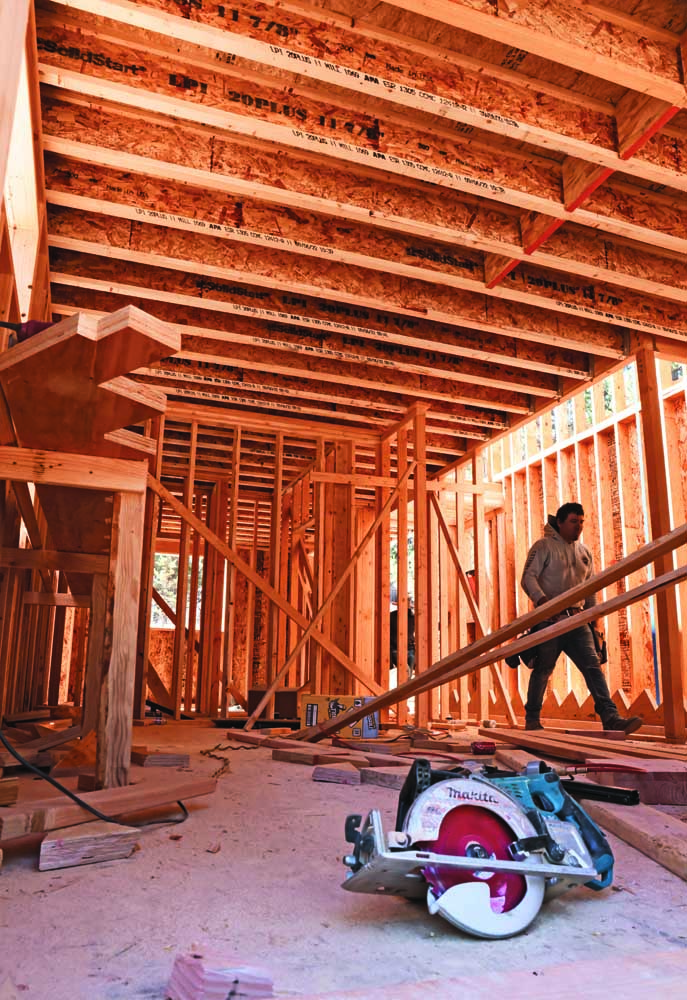City postpones changes to SDCs to account for concerns from businesses, developers
Published 5:45 am Sunday, January 28, 2024

- The Bend City Council is weighing changes to system development charges, the one-time fees on new developments that help the city pay for its current and future growth.
Bend is weighing changes to system development charges, the one-time fees on new developments that help the city pay for its current and future growth.
The City Council was poised to give preliminary approval to certain changes to the city’s system development charges, or SDCs, on Jan. 17. Approval was tabled after concerns from local business owners, developers and organizations highlighted worries that increased fees would be passed along to customers. Follow-up discussion on the issue hasn’t been scheduled.
SDCs are water, sewer and transportation fees paid by developers at the time new development permits are issued. Funds collected from SDCs can only be used to help pay for infrastructure improvement projects that accommodate growth, which are included in designated project lists.
The proposed changes include sweeping updates to SDCs for commercial businesses and specific alterations to SDCs for residential development. Plus, the update aims to include greater consistency between the different water, sewer and transportation SDCs.
Dr. Divya Sharma, a local internist, recently took over a small, private practice in Bend. Sharma is grappling with an increased patient demand and the need to expand that small practice, she said at the Jan. 17 meeting. Expansion would mean paying a much greater amount in SDCs under the proposed changes.
“I don’t think I could even exist if those are the costs for us to try to expand one additional exam room to try to accommodate maybe a hundred more patients,” Sharma said. “I don’t know how we would pay for it.”
Medical and veterinary offices are among the most impacted by the proposed changes. Sharma advocated for the city to consider exemptions for medical facilities.
Under the new changes, childcare facilities, certain affordable housing developments and homeless shelters could qualify for SDC exemptions.
To prioritize housing affordability, the city proposed tailoring SDCs to the square footage of single-family homes and certain multiplexes and charging by the unit for housing developments that have more than four units. That’s instead of charging a uniform rate.
Paying for Bend’s growth
Oregon does not allow cities to regulate growth, said Eric King, Bend’s city manager.
“We have to plan for growth,” he said at the Jan. 17 City Council meeting. “That is the whole context of the statewide land use system.”
That means Oregon cities’ land use plans, the infrastructure to support those plans and, therefore, SDC fees and methodologies are based on accommodating population growth forecast by Portland State University.
Bend’s current population is an estimated 106,275 people, per the university’s 2023 estimates. It’s expected to grow to 155,806 by 2045.
The existing SDC methodologies were designed more than a decade ago when the city’s population was well under 100,000 people.
It’s a big update, said Russell Grayson, the city’s chief operations officer.
“If the city stops growing tomorrow, there’s still a certain limit of infrastructure needed to support the current population,” Grayson said.
In part, fee hikes within both SDCs and the looming transportation utility fee help compensate for Bend’s disproportionately low tax rates due to Measures 5 and 50, which were ballot measures that imposed limits on Oregon cities’ property tax rates in the 1990s.
However, a worry persists among business owners and development professionals that increases to SDCs will mean a higher barrier to expanding businesses or starting new developments and increased costs passed along to customers.
The Bend Chamber of Commerce, the Central Oregon Association of Realtors and the Central Oregon Business Association described in a letter with more than 60 signatures their support for some aspects of the proposed changes and their strong opposition to others.
In particular, the organizations were “highly concerned by the potential impact of such a significant increase to commercial SDCs.”
“The cost of affordable housing initiatives should not be borne solely by Bend’s businesses and commercial property owners and tenants,” the letter dated Jan. 17 read.
To account for those concerns and others, the City Council extended the public hearing to an undetermined date and approved an ordinance updating the city’s code to streamline internal SDC processes. The vote was 6-0 in favor with Councilor Megan Norris recused due to her employment at Hayden Homes, which could be financially impacted by the SDC changes.
A comprehensive list of proposed SDC changes is available at bendoregon.gov/sdc.







